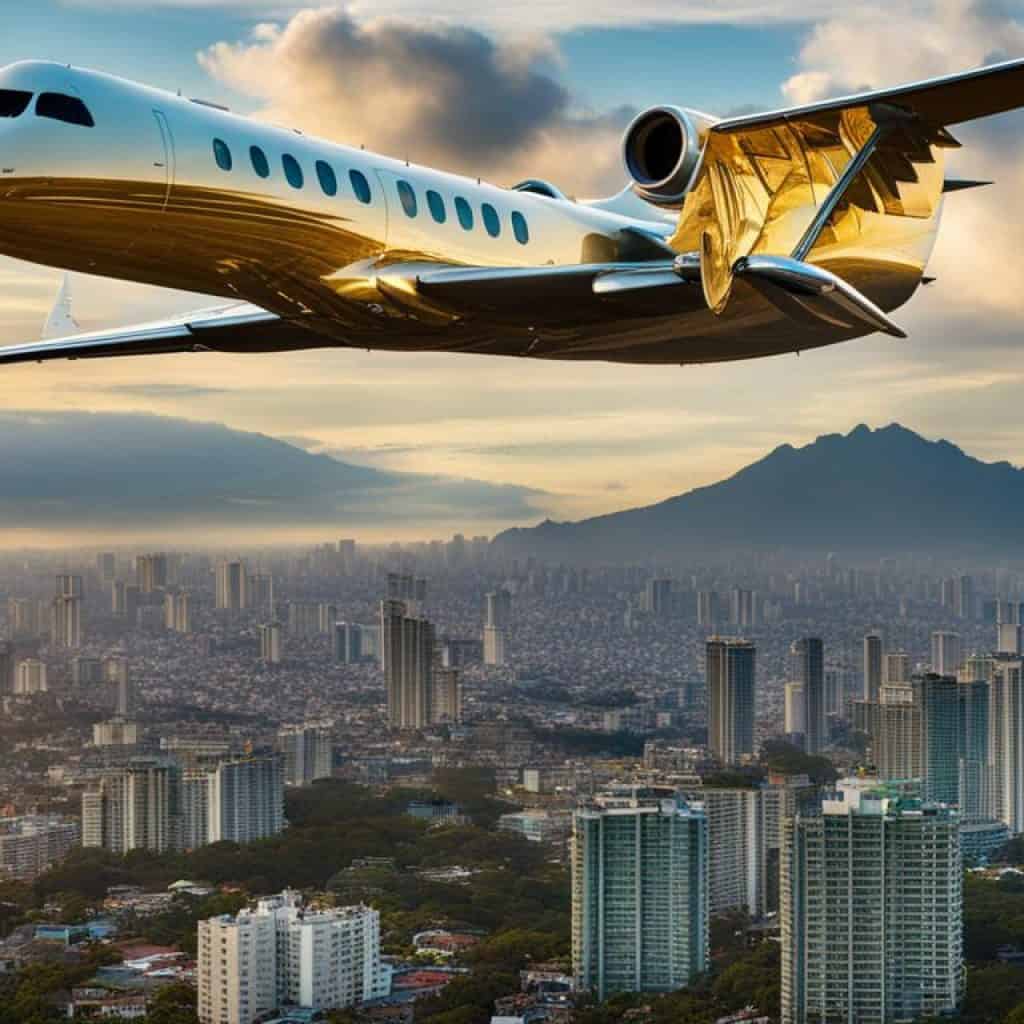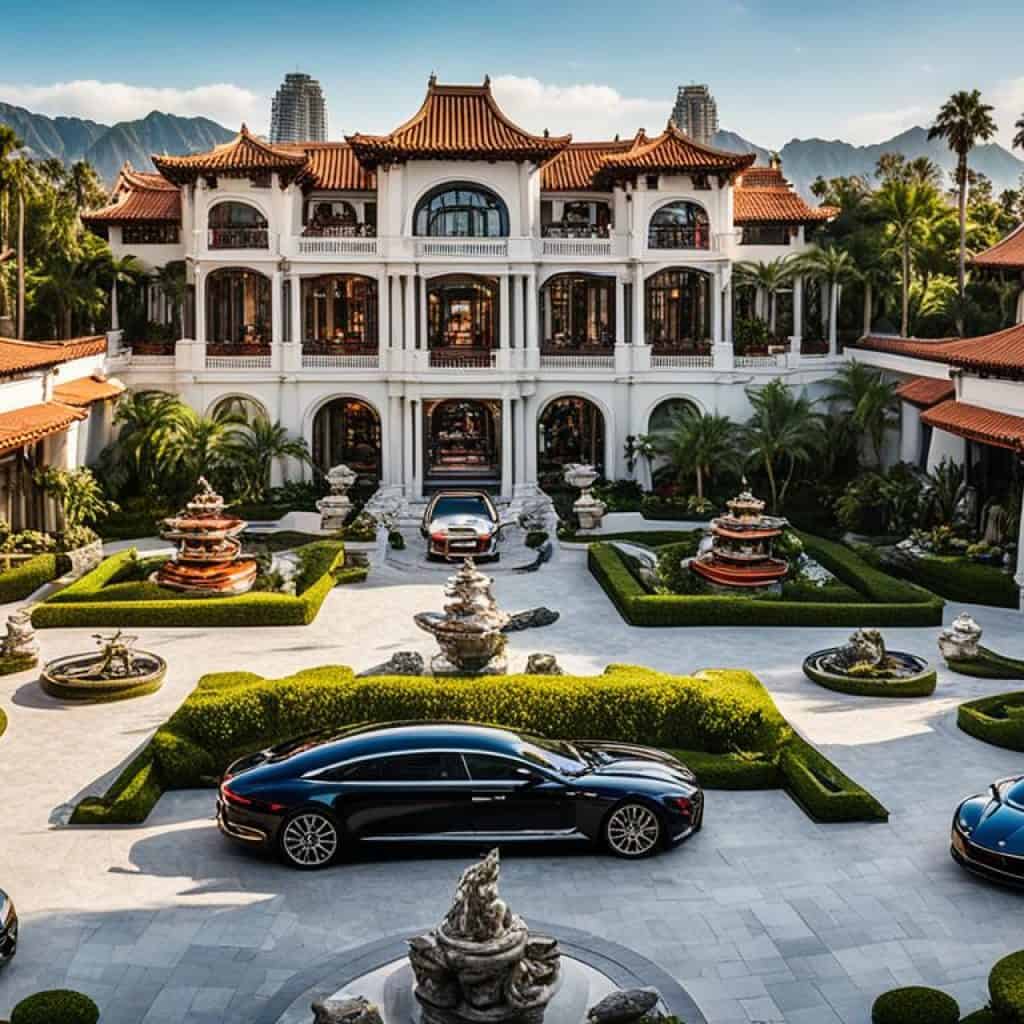Who holds the title of the richest family in the Philippines? With a country known for its economic disparities and thriving dynasties, it is a question that piques curiosity and challenges perceptions. In this article, we delve into the wealth and power of the Philippines’ wealthiest family and explore their vast empires.
Key Takeaways:
- The Philippines is home to several wealthy families, but one stands out as the richest.
- This article uncovers the immense wealth and influence of the Philippines’ wealthiest family.
- Explore the economic disparities and dynastic power that exist in the country.
- Discover the impact of wealth inequality on economic opportunities and society.
- Find out about the success stories of immigrant taipans and young entrepreneurs in the Philippines.
The Stark Reality of Inequality in the Philippines
In 1969, Senator Benigno “Ninoy” Aquino Jr. shed light on the grim truth of economic inequality in the Philippines. He revealed that while only 1% of Filipino families enjoyed a life of affluence, the majority of the population struggled with poverty. Sadly, as we look at recent years, not much has changed. The gap between the rich and the poor remains wide, with a small fraction of households earning high incomes while the vast majority grapple to make ends meet.
This stark reality of inequality underscores the urgent need for action. It is crucial to address the root causes that perpetuate this imbalance in wealth and opportunity. By doing so, we can strive towards a more equitable society where everyone has access to the resources and support they need to thrive.
“Inequality can have profound consequences on individuals and society as a whole. It erodes social cohesion, perpetuates social exclusion, and limits economic mobility.”
Economic inequality in the Philippines not only presents immediate challenges, such as increased poverty rates and limited access to basic necessities, but it also hinders long-term economic growth and stability. When resources and opportunities are concentrated in the hands of a few, the potential contributions of talented individuals from all walks of life are squandered. This not only undermines the potential of individuals but also weakens the overall fabric of society as innovation and productivity suffer.
The time to address this issue is now. By implementing comprehensive and inclusive policies, we can work towards dismantling the systemic barriers that perpetuate inequality. This involves reforms in education, employment, social welfare, and governance, among other areas. It requires a collective effort from government, businesses, and civil society to ensure that no one is left behind.
The Devastating Impact of Poverty
Poverty in the Philippines remains a pressing issue. It affects millions of individuals and families, depriving them of basic necessities, healthcare, and quality education. The consequences of poverty go beyond the obvious material deprivations. Poverty creates a vicious cycle that traps individuals and generations in a cycle of limited opportunities and unfulfilled potential.
Furthermore, poverty often leads to social exclusion, marginalization, and a lack of voice in decision-making processes. This furthers the vicious cycle, as those in poverty are unable to advocate for their own rights and needs. Addressing poverty is not only a matter of meeting basic needs but also restoring dignity, promoting social inclusion, and empowering individuals to break free from the chains of poverty.
Addressing Inequality and Poverty
To combat economic inequality and poverty in the Philippines, a multi-faceted approach is necessary. This includes:
- Investing in quality education to level the playing field and equip individuals with the skills needed to succeed in a rapidly changing economy.
- Creating job opportunities with fair wages and benefits, ensuring that work becomes a pathway out of poverty.
- Establishing comprehensive social protection programs that provide a safety net for vulnerable populations.
- Promoting inclusive economic policies that foster entrepreneurship and empower marginalized communities.
- Reducing corruption and strengthening the rule of law to ensure equitable access to resources and opportunities.
By taking decisive action to address economic inequality and poverty, the Philippines can unlock the full potential of its people and build a more prosperous and inclusive future. Through systemic reforms, the nation can pave the way for shared prosperity, where every Filipino has the opportunity to lead a dignified and fulfilling life.
The Impact of Inequality on Economic Opportunities
Inequality of outcomes is rooted in an inequality of economic opportunities in the Philippines. This is evident in the wide differences in the quality of education, lack of decent jobs, and an economic environment that favors larger firms. Such inequality can lead to a less efficient and more volatile economic system.
Education plays a crucial role in shaping economic opportunities. Unfortunately, there is a significant disparity in the quality of education across the country. Many children from low-income families struggle to access quality education, limiting their future prospects. This unequal distribution of educational resources perpetuates the cycle of inequality, hindering social mobility and preventing individuals from realizing their full potential.
The lack of decent jobs further exacerbates economic inequality. The Philippines faces challenges in creating sufficient employment opportunities for its growing population. Many people are forced to accept low-paying and informal jobs with no benefits or job security. Limited access to formal employment leads to stagnant wages and hinders upward mobility, trapping individuals and families in a cycle of poverty.
In addition, the economic landscape in the Philippines often favors larger firms, exacerbating economic inequality. These firms have better access to resources, capital, and government support, allowing them to dominate industries and stifle competition. Small and medium-sized enterprises, which could potentially provide employment and entrepreneurial opportunities, are often marginalized and struggle to thrive in such an environment.
“The unequal distribution of income and wealth in the Philippines limits the potential for inclusive economic growth and social progress. It is imperative to address the roots of inequality and create a more level playing field for all individuals and businesses.” – John Reyes, Economist
Fostering Equal Economic Opportunities
To address the impact of inequality on economic opportunities, it is critical to implement comprehensive reforms that promote inclusivity and equal access.
- Improving the quality of education: Investing in education infrastructure, teacher training, and curriculum development to ensure that all children receive a high-quality education regardless of their socio-economic background. This would help to provide a solid foundation for future economic success.
- Creating favorable business conditions for SMEs: Implementing policies that support small and medium-sized enterprises, such as reducing bureaucratic red tape, providing access to financing, and offering business development programs. This would help stimulate entrepreneurship, job creation, and promote a more vibrant and competitive business landscape.
- Strengthening social protection programs: Establishing robust social safety nets and welfare programs to provide assistance to vulnerable individuals and households. This would help protect the most marginalized groups and ensure a basic standard of living for all.
By addressing the underlying causes of inequality and fostering equal economic opportunities, the Philippines can work towards building a more equitable society, where all individuals have a fair chance to thrive and contribute to the country’s development.
| Challenges | Impact |
|---|---|
| Unequal distribution of educational resources | Restricts social mobility and perpetuates poverty |
| Lack of decent jobs | Hinders upward mobility and traps individuals in poverty |
| Economic environment favoring larger firms | Curbs competition and limits opportunities for SMEs |
The Wealth of the Richest Families in the Philippines
The net wealth of the 40 wealthiest families in the Philippines is staggering, amounting to billions of dollars. These families have built empires across various industries, including conglomerates, banks, and real estate. Their vast fortunes accumulated over the years reflect the extreme economic disparity plaguing the country.

| Rank | Family | Net Worth (in billions of dollars) |
|---|---|---|
| 1 | **Sy** | 20.7 |
| 2 | **Tañada** | 14.4 |
| 3 | **Ayala** | 12.6 |
| 4 | **Zobel** | 8.9 |
| 5 | **Gokongwei** | 7.1 |
These figures highlight the significant wealth concentration within a select few families, while millions of Filipinos struggle to escape poverty. The economic disparities have far-reaching consequences, impacting access to basic necessities, educational opportunities, and social mobility.
Despite efforts to address the issue, wealth inequality remains a pressing concern in the Philippines. Achieving a more equitable society requires systemic reforms, inclusive economic policies, and a concerted effort to bridge the gap between the richest families and the rest of the population.
The Influence of Political Dynasties on Economic Inequality
Political inequality and economic inequality are closely intertwined in the Philippines. The concentration of political power among dynastic families often exacerbates economic disparities, perpetuating a cycle of inequality. These influential families have a firm grip on vast resources and have exclusive access to lucrative economic opportunities, widening the gap between the wealthy few and the struggling majority.
Political dynasties control key government positions, enabling them to shape policies and regulations in their favor. This influence further entrenches their economic power, limiting competition and hindering the growth of small businesses. The lack of a level playing field denies others the chance to succeed, contributing to the unequal distribution of wealth in the country.
“Political dynasties control key government positions, enabling them to shape policies and regulations in their favor.”
Moreover, the influence of political dynasties extends beyond economic opportunities. These families often utilize their power to secure contracts and favorable deals for their businesses, while marginalized sectors of society struggle to gain a foothold in the economic landscape. The resulting disparities in income and wealth further deepen social divisions and hinder inclusive growth.
The impact of political dynasties on economic inequality is evident not only at the national level but also in local governance. It is not uncommon for powerful families to dominate local political offices, consolidating their influence and perpetuating their control over resources and development initiatives.
To combat the adverse effects of political dynasties on economic inequality, there is a need for governance reforms. Strengthening democracy, promoting transparency, and implementing anti-dynasty laws are steps towards a more inclusive and equitable society. By breaking the cycle of political and economic concentration, the Philippines can foster an environment that encourages fair competition, equal opportunities, and shared economic prosperity.
| Impact of Political Dynasties | Solutions for Inclusive Growth |
|---|---|
| Control over resources & economic opportunities | Strengthen democracy & promote transparency |
| Consolidation of power in local governance | Implement anti-dynasty laws |
| Wide disparities in income & wealth | Encourage fair competition & equal opportunities |
The Way Forward
To create a more just and inclusive society, the Philippines needs to address the influence of political dynasties on economic inequality. By leveling the playing field and promoting equal access to economic opportunities, the country can unlock the potential of its citizens and foster sustainable development for all.
Immigrant Success Stories: From Rags to Riches
Among the wealthiest individuals in the Philippines are first-generation Filipino-Chinese immigrants from Fujian province in China. Their success stories serve as inspiring examples of achieving prosperity despite humble beginnings. Notable figures like Henry Sy and Lucio Tan have built vast business empires from the ground up, illustrating the potential for upward mobility in the country.
Henry Sy, originally from Xiamen, China, arrived in the Philippines with his family in the 1930s. Through hard work and determination, he established a small shoe store that eventually grew into the SM Group, one of the largest conglomerates in the Philippines. Today, the Sy family is widely regarded as one of the country’s wealthiest families, with interests spanning retail, banking, and real estate.
“I guess, success is based on the right timing, the right strategy, and the right organization.”
Similarly, Lucio Tan, also of Chinese descent, migrated to the Philippines in the 1950s. Starting as a janitor, he seized opportunities in the tobacco and beverage industries. Tan established LT Group, a conglomerate that now encompasses businesses ranging from tobacco and airlines to banking and property development.
The success stories of first-generation immigrant taipans like Henry Sy and Lucio Tan serve as a testament to the Filipino-Chinese community’s resilience, entrepreneurial spirit, and determination. These individuals have not only achieved remarkable personal success but have also contributed significantly to the economic growth and development of the Philippines.
Here is a table showcasing the incredible journeys of these immigrant taipans:
| Name | Country of Origin | Key Industries | Net Worth (Billions of US Dollars) |
|---|---|---|---|
| Henry Sy | China | Retail, Banking, Real Estate | 20.5 |
| Lucio Tan | China | Tobacco, Beverages, Airlines, Banking, Property Development | 3.6 |
The success achieved by these first-generation Filipino-Chinese immigrants provides hope and inspiration to aspiring entrepreneurs across the Philippines. Their journey showcases the possibilities for anyone who dares to dream big, work hard, and seize opportunities in a country ripe with potential.
Chinese Business Dynasties in the Philippines
Chinese business dynasties have made a significant impact on the Philippines’ business landscape, with their success stories becoming an integral part of the nation’s economic growth. Some of the wealthiest Chinese families in the Philippines, known as taipans, have established successful companies in various industries, showcasing their entrepreneurial prowess and contribution to the country’s development.
One prominent Chinese business dynasty is the Gokongwei family, led by John Gokongwei Jr. Starting with a small trading business, the Gokongwei family expanded their empire to include diverse industries such as retail, telecommunications, and aviation. Their flagship company, JG Summit Holdings, has become one of the most prominent conglomerates in the country, epitomizing the spirit of entrepreneurship and innovation.
The Yuchengco family is another influential Chinese business dynasty in the Philippines. They have made their mark in the insurance and banking sectors, with the establishment of the Malayan Insurance Company and Rizal Commercial Banking Corporation (RCBC). Through their entrepreneurial endeavors, the Yuchengco family has played a significant role in the development of these industries, contributing to the nation’s financial stability.
Lastly, the Gozon family has made notable contributions to the media industry in the Philippines. Led by Felipe L. Gozon, they are the founders and executives of GMA Network Inc., one of the largest media conglomerates in the country. The Gozon family’s dedication and vision have helped shape the media landscape, providing the Filipino population with diverse and engaging content.

“The success of Chinese business dynasties in the Philippines reflects their resilience, adaptability, and determination to create opportunities in challenging environments. These families have not only accumulated significant wealth but have also created employment opportunities and contributed to the overall economic prosperity of the country.”
These are just a few examples of the Chinese business dynasties that have shaped the Philippine business landscape. They serve as an inspiration for aspiring entrepreneurs and highlight the immense potential for growth and success in the country. The influence of these dynasties extends beyond their individual businesses, as they contribute to the overall economic development and prosperity of the Philippines.
The Rise of Young Entrepreneurs
The Philippines is witnessing the emergence of a new crop of young entrepreneurs who are blazing a trail in the business world. These next-generation Filipino billionaires have displayed remarkable prowess in building their own companies and amassing significant wealth at a relatively young age. Among these rising stars are Andrew Tan, Tony Tan Caktiong, and Manuel Villar.
Andrew Tan: From Start-up to Success
Andrew Tan, the founder of Megaworld Corporation, has left an indelible mark on the real estate industry. Starting with modest beginnings, Tan transformed a small liquor distillery into one of the country’s leading property developers. Under his visionary leadership, Megaworld has become a driving force behind the urban development landscape in the Philippines.
Tony Tan Caktiong: A Fast-Food Icon
Tony Tan Caktiong, the man behind Jollibee Foods Corporation, has propelled the popular fast-food chain to international success. His entrepreneurial journey began with the opening of a small ice cream parlor, which eventually evolved into a global brand that rivals the most renowned fast-food giants. Caktiong’s dauntless spirit has contributed to the expansion and diversification of Jollibee’s offerings.
Manuel Villar: Building Empires
Manuel Villar’s business acumen has culminated in the success of his real estate empire, Vista Land & Lifescapes. As the founder and chairman of the company, Villar has propelled Vista Land to become one of the country’s largest integrated property developers. Through strategic investments and a keen eye for market trends, Villar has solidified his position as a prominent figure in the real estate industry.
These young entrepreneurs embody the spirit of innovation, resilience, and determination. Their achievements inspire aspiring business leaders across the Philippines, igniting a renewed sense of hope and ambition. As these next-generation Filipino billionaires continue to shape the business landscape, their success stories serve as a reminder that age is no barrier to entrepreneurial success.
Media Moguls and their Influence
Media ownership has always held significant power and influence in shaping public opinion and contributing to the media landscape. In the Philippines, there are notable figures who have made a substantial impact as media moguls, further establishing their influence on society.
One such influential individual is Iñigo Zobel, whose ownership of various media outlets has allowed him to shape public discourse and contribute to the dissemination of information. His influence extends to multiple platforms, including television, radio, and print media.
Another influential media mogul in the Philippines is Tony Tan Caktiong. While primarily known as the founder and chairman of Jollibee Foods Corporation, one of the largest fast-food chains in the country, Tan Caktiong has also made significant investments in the media industry. His media ownership includes various radio stations and a television network, giving him a platform to reach millions of Filipinos.
Through their media ownership, both Iñigo Zobel and Tony Tan Caktiong have the power to shape public opinion and influence the narrative on various issues. Their ability to control the flow of information highlights the significant role media moguls play in the Philippines.
| Media Moguls in the Philippines | Influence of Media Ownership |
|---|---|
| Iñigo Zobel | Shaping public discourse and dissemination of information through various media platforms |
| Tony Tan Caktiong | Controlling radio stations and a television network to reach millions of Filipinos |
The Influence of Political Dynasties on Wealth
Political dynasties in the Philippines have often been connected to wealth accumulation. Families like the Lopezes and Cojuangcos have had members serving in politics while also managing vast business empires. This intertwining of political and economic power perpetuates inequality and hinders opportunities for others.
Political Connections and Wealth Accumulation
The influence of political dynasties on wealth is evident in the Philippines. Families who have established themselves in politics often leverage their positions to further expand their business interests, accumulating significant wealth in the process. This concentration of power in the hands of a few families creates barriers for others to access resources and opportunities.
“The intertwining of political and economic power perpetuates inequality and hinders opportunities for others.”
Political connections play a crucial role in wealth accumulation for these dynastic families. By leveraging their political influence and networks, they can secure favorable business deals, contracts, and access to resources. This preferential treatment further widens the gap between the wealthy dynasties and the rest of the population.
Furthermore, political dynasties often control crucial sectors of the economy, such as media, banking, and real estate. This consolidation of power and influence allows them to shape policy decisions and regulations in their favor, creating an environment that perpetuates their wealth.
In addition, the connection between political dynasties and wealth accumulation extends beyond the direct influence on businesses. The economic success of political dynasty members can also be attributed to the reputation and recognition they gain from their political positions. This can attract investors, customers, and business opportunities, providing further advantages in wealth accumulation.
Political Dynasties and Wealth Accumulation
| Political Dynasty | Key Business Areas | Estimated Net Worth |
|---|---|---|
| Lopezes | Media, Energy | $2.7 billion |
| Cojuangcos | Farming, Food, Beverage | $1.4 billion |
Table: Political dynasties and their key business areas along with estimated net worth.
The table above showcases the wealth accumulated by political dynasties such as the Lopezes and Cojuangcos. Through their control over influential sectors like media and agriculture, these families have amassed substantial fortunes, reinforcing their economic dominance in the country.
This concentration of power has raised concerns about the fairness of the political and economic systems in the Philippines. It highlights the need for measures to promote a level playing field and equal opportunities for all, rather than perpetuating the wealth and influence of a few elite families.
Changing of the Guards: Next-generation Billionaires
As the older generation of billionaires in the Philippines prepares to step down, the stage is set for the next-generation billionaires to assume leadership in their family businesses. Manuel Villar and Teresita Sy-Coson are shining examples of successors who will inherit and shape the future of their family’s wealth and influence.
Manuel Villar, the son of former Senate President Manny Villar, has already made significant contributions as an entrepreneur and businessman. He founded Vista Land & Lifescapes, one of the country’s largest real estate developers, which has been instrumental in reshaping the landscape of the Philippine property market. With his extensive experience and expertise, Villar is well-positioned to continue his family’s legacy and expand their business empire.
Teresita Sy-Coson, on the other hand, is poised to inherit the reins of the SM Group, founded by her father, Henry Sy Sr., considered one of the wealthiest individuals in the Philippines. As the vice-chairperson of SM Investments Corporation, Sy-Coson has actively participated in the company’s growth and diversification. Her innovative ideas and strategic vision have contributed to the success of SM, which operates a vast network of malls, supermarkets, and other retail ventures.
“The younger generation represents fresh perspectives, innovation, and a drive to continue the legacy while adapting to the evolving business landscape. Manuel Villar and Teresita Sy-Coson are emblematic of the next wave of Philippine billionaires, each with their unique strengths and ambitions.”
The rise of next-generation billionaires brings hope and excitement for the future of Philippine business. They have been exposed to the challenges and successes of their predecessors, allowing them to draw insights from both triumphs and failures. With their determination, expertise, and access to resources, these young entrepreneurs are ready to make their mark and contribute to the growth and prosperity of the Philippine economy.
| Next-generation Billionaires | Inheritance | Key Businesses |
|---|---|---|
| Manuel Villar | Vista Land & Lifescapes | Real estate development |
| Teresita Sy-Coson | SM Group | Retail, real estate, banking |
The transition of power from one generation to the next not only ensures continuity but also infuses fresh ideas and perspectives into family businesses. The next-generation billionaires in the Philippines, such as Manuel Villar and Teresita Sy-Coson, possess the knowledge, passion, and innovative spirit needed to navigate the ever-changing business landscape and drive sustainable growth.

Succession Planning: Ensuring a Smooth Transition
A successful transition from one generation to the next requires careful planning and preparation. In wealthy families, succession planning is critical to maintain the family’s legacy, protect assets, and sustain long-term success. The younger generation must be equipped with the necessary skills and knowledge to effectively manage the complexities of their family businesses.
Succession planning includes identifying and preparing potential successors, providing them with mentorship and leadership opportunities, and ensuring a seamless transfer of ownership and decision-making authority. By investing in the development and empowerment of the next generation, wealthy families can ensure the continued growth and prosperity of their businesses for years to come.
The Impact of Wealth Disparities on Society
The significant wealth disparities in the Philippines have profound implications for social issues such as poverty and inequality. The concentration of wealth among a few families hinders equal opportunities and perpetuates a cycle of poverty for many Filipinos.
When wealth is concentrated in the hands of a privileged few, it widens the gap between the rich and the poor, leading to social unrest and dissatisfaction. The resulting inequality undermines social cohesion and exacerbates existing problems.
One of the most significant consequences of wealth disparities is the persistence of poverty. The majority of Filipinos struggle to meet their basic needs while a small fraction enjoys immense wealth and privilege. This disparity creates an environment where upward mobility becomes increasingly difficult and the cycle of poverty becomes self-perpetuating.
Poverty and inequality not only affect individuals and families but also have wider societal implications. Limited access to quality education, healthcare, and basic services further entrenches existing inequalities, creating a vicious cycle that is difficult to break.
The social fabric of society is also affected by wealth disparities. Disparities in power and influence can lead to unequal representation and decision-making processes, marginalizing certain groups and perpetuating a system that benefits the few at the expense of the many.
“When wealth is concentrated in the hands of a privileged few, it widens the gap between the rich and the poor, leading to social unrest and dissatisfaction.”
To address these social impacts, it is essential to implement policies and programs that promote inclusive growth and reduce wealth disparities. This includes investing in education and skills training, expanding access to healthcare and social services, and creating economic opportunities for marginalized communities.
By addressing the underlying causes of poverty and inequality, society can foster social mobility, improve living standards, and create a fairer and more just society.
The Social Impact of Wealth Disparities in the Philippines
| Impact | Description |
|---|---|
| 1. Poverty | The concentration of wealth exacerbates poverty, making it difficult for individuals and families to escape the cycle of poverty. |
| 2. Inequality | Wealth disparities widen the gap between the rich and the poor, leading to social unrest and dissatisfaction. |
| 3. Limited access | Wealth disparities limit access to quality education, healthcare, and basic services, further entrenching inequality. |
| 4. Marginalization | Disparities in power and influence can lead to the marginalization of certain groups, perpetuating an unjust system. |
Investing in Inclusive Development
To break the cycle of inequality, inclusive development reforms are necessary. These reforms should focus on creating more competitive and fair economic and political environments that promote equal opportunities for all. Initiatives like the Competition Policy Bill and the Anti-Dynasty Bill could help level the playing field and foster more inclusive growth.
The Importance of Inclusive Development Reforms
Inclusive development reforms hold the potential to significantly impact society and create a more equitable future. By addressing the root causes of inequality, these reforms can pave the way for sustainable economic growth and social cohesion. It is crucial to prioritize inclusive development as a fundamental aspect of nation-building.
One key area where inclusive development reforms can make a significant difference is in creating a competitive and fair economic landscape. By implementing policies that promote competition and discourage monopolistic practices, the government can ensure that all businesses, regardless of their size, have a fair chance to thrive. This encourages entrepreneurship, innovation, and job creation, ultimately benefiting the entire society.
“Inclusive development reforms can break down barriers and provide marginalized communities with access to resources, education, and opportunities that were once out of reach.”
Inclusive development reforms also aim to address the unequal distribution of political power. The Anti-Dynasty Bill, for example, seeks to limit the influence of political dynasties that have perpetuated economic inequality. By reducing the concentration of power within a few families, this reform can open doors for new voices and perspectives in governance, ensuring more inclusive policies and decisions.
The Role of the Competition Policy Bill
The Competition Policy Bill, another crucial component of inclusive development reforms, promotes fair competition and prevents monopolies. By fostering a level playing field for businesses, this legislation encourages innovation, lower prices, and better quality products and services for consumers. The Competition Policy Commission, empowered by this bill, plays a vital role in enforcing fair business practices and safeguarding the interests of both consumers and smaller enterprises.
The Anti-Dynasty Bill and Breaking the Cycle of Inequality
The Anti-Dynasty Bill seeks to address the interconnectedness of political and economic power in the Philippines. By limiting political dynasties and promoting equal opportunity in politics, this legislation aims to break the cycle of inequality perpetuated by concentrated wealth and influence. By creating a more level playing field, the Anti-Dynasty Bill can encourage a broader representation of voices and ensure that political power is not limited to a privileged few.
Achieving Inclusive Development: The Way Forward
To achieve genuine inclusive development, there must be a coordinated effort from various sectors, including government, businesses, civil society, and communities. Reforms should prioritize access to quality education and healthcare, support small and medium enterprises, and provide social safety nets for the most vulnerable. Collaboration and long-term commitment are key to truly breaking the cycle of inequality and fostering an equitable and prosperous society for all Filipinos.
Investing in inclusive development reforms is not only a moral imperative but also a strategic choice that can unlock the full potential of the Philippines. By prioritizing fairness, equal opportunities, and social mobility, the nation can build a sustainable and inclusive future for generations to come.
Conclusion
In conclusion, our exploration of the wealthiest family in the Philippines reveals a stark reality of economic inequality, political dynasties, and inspiring immigrant success stories. The concentration of wealth and power in the hands of a few families underscores the urgent need for inclusive development and systemic reforms to create a fairer and more equitable society.
Economic inequality in the Philippines remains a significant challenge, with a small fraction of households controlling the majority of wealth while many struggle to meet their basic needs. The close connection between political and economic inequality further exacerbates this disparity, as political dynasties often control vast resources and economic opportunities that hinder equal wealth distribution.
However, amidst this landscape, there are also stories of resilience and achievement. Immigrants from Fujian province in China, such as Henry Sy and Lucio Tan, exemplify the potential for upward mobility. Additionally, the emergence of young entrepreneurs like Andrew Tan and Tony Tan Caktiong showcases the opportunities for success through entrepreneurship.
To address the significant wealth disparities in the country, inclusive development reforms are crucial. Initiatives such as the Competition Policy Bill and the Anti-Dynasty Bill aim to level the playing field and promote equal opportunities for all. By creating a more competitive and fair economic and political environment, we can break the cycle of inequality and foster a more inclusive society that benefits all Filipinos.














Add comment